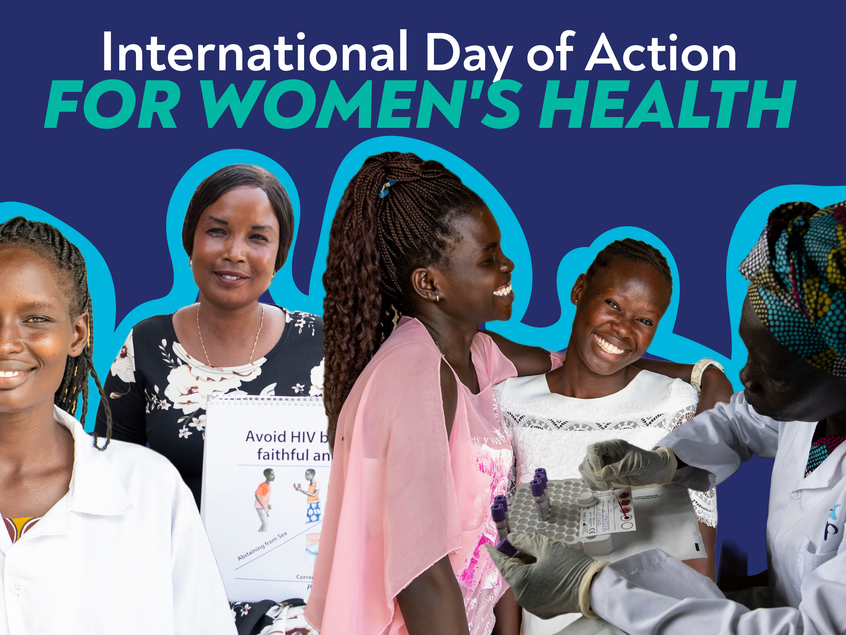On this year’s International Day of Action for Women’s Health, the need for renewed recognition and support of women’s sexual and reproductive health rights is of paramount importance.
Twenty years ago, ICAP was founded on the premise that women’s health is integral to family and community well-being. At a time when access to HIV treatment was beyond reach for millions in low- and middle-income countries, ICAP pushed for making such treatment available to women, their children and partners as part of the groundbreaking MTCT-PLUS Initiative. That initiative proved beyond a shadow of a doubt that provision of HIV treatment was feasible in those settings and that women can be the vanguards to saving millions of lives.
Two decades later, while significant progress has been made in confronting the global HIV epidemic, women and girls still face enormous challenges. In sub-Saharan Africa, six in seven new HIV infections among adolescents are among girls; and girls and young women 15-24 years of age are twice as likely to be living with HIV than young men. Globally, around 4,900 girls and young women acquire HIV infection every week.
This disparity can be attributed to a number of causes, including poverty, discriminatory legal and cultural norms, gender-based violence, and inadequate schooling for women and girls, all of which make them more vulnerable to not only HIV but also a host of other health challenges, especially those affecting sexual and reproductive health.
In response to these challenges, ICAP has been supporting innovative approaches to advancing the health of women and girls in the countries where we work.
For example, in South Sudan, ICAP has supported the training of mentor mothers to help guide pregnant women living with HIV through pregnancy, birth, and breastfeeding. Mentor mothers — who are themselves living with HIV — visit the homes of the women they are assigned to conduct health education, provide breastfeeding support, monitor women’s viral loads, offer follow-up for mothers who have interrupted antiretroviral therapy, and ensure that mothers and infants are followed post-delivery to monitor mother and infant health. They also provide counseling, a critical component to combatting stigma and maintaining engagement with HIV and child health services.
In Ethiopia, ICAP has focused on cervical cancer, the leading cause of cancer deaths among women in sub-Saharan Africa in general, particularly among women living with HIV. To raise awareness about cervical cancer and enable more women to access screening and treatment, ICAP supported the Ministry of Health to bring low-cost, safe, and effective cervical cancer services to 505 health facilities across the country.
In Tanzania and Mozambique, ICAP is an implementing partner of the Determined, Resilient, Empowered, AIDS-Free, Mentored, and Safe (DREAMS) initiative led by the President’s Emergency Plan for AIDS Relief (PEPFAR) and a coalition of private partners to provide a comprehensive, multi-sectoral package of core interventions to address key factors that make girls and young women particularly vulnerable to HIV. In Tanzania, in just two years, ICAP has enrolled over 48,000 girls in DREAMS, providing them with access to HIV testing, prevention, treatment as well as support for gender-based violence and vocational training; it has also provided a total of 99 million TZS ($42,682 USD) in loans to support 742 income-generating activities. In Mozambique, ICAP and its community partners have enrolled another 52,000 adolescent girls and young women into DREAMS.
Today, on this International Day of Action for Women’s Health, we note that there is much more work to do. In countries around the world, women continue to face formidable barriers to accessing safe, reliable, responsive, affordable, and accessible health services, including interference with their rights to make their own decisions regarding their health. Helping women across the globe overcome these barriers is a pillar of our mission, as it has been for two decades.
Today, and every day, we at ICAP pledge to support the health of women wherever we work. For only when women are healthy can we truly realize the dream of global health.
About ICAP
A major global health organization that has been improving public health in countries around the world for two decades, ICAP works to transform the health of populations through innovation, science, and global collaboration. Based at Columbia Mailman School of Public Health, ICAP has projects in more than 40 countries, working side-by-side with ministries of health and local governmental, non-governmental, academic, and community partners to confront some of the world’s greatest health challenges. Through evidence-informed programs, meaningful research, tailored technical assistance, effective training and education programs, and rigorous surveillance to measure and evaluate the impact of public health interventions, ICAP aims to realize a global vision of healthy people, empowered communities, and thriving societies. Online at icap.columbia.edu








